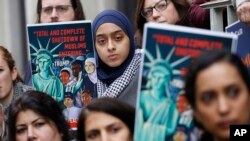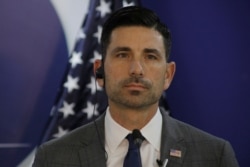The United States will begin enforcing an expanded travel ban on February 21, a move that the Trump administration says is critical to national security. But critics question the rationale behind the amended policy.
Myanmar (Burma), Eritrea, Kyrgyzstan, Nigeria, Sudan and Tanzania are now part of an amended executive order that already maintains travel restrictions on some citizens from Iran, Libya, Somalia, Syria and Yemen, along with Venezuela and North Korea.
In announcing the expanded travel restrictions last week, the Trump administration signaled that security concerns were paramount.
"It is logical and essential to thoroughly screen and vet everyone seeking to travel or immigrate to the United States," acting Homeland Security Secretary Chad Wolf said in a statement. "However, there are some countries from whom the U.S. does not receive the necessary information about its travelers and, as a result, pose a national security or public safety risk that warrants tailored travel restrictions.”
People from the six added countries will no longer be able to travel to the United States on an immigrant visa, unless they apply for and obtain a waiver. But visas will continue to be issued for tourists, business travelers and those seeking medical treatment.
Rules make 'little sense'
"For an administration concerned about security threats, favoring temporary visitors over more permanent ones from flagged countries makes little sense,“ said University of Texas at Austin history professor Toyin Falola.
"Somebody with a fixed address in Chicago, in New York, with a place of employment, is the least disposed to creating troubles, because they will be caught,” Falola said.
Nigerian Foreign Minister Geoffrey Onyeama met with Secretary of State Mike Pompeo on Tuesday and said he’d been “blindsided” by the travel restrictions. In response, he pledged to improve security cooperation with the United States.
"We're putting in place the architecture that will now make the information and the data on [travelers] immediately available to the U.S. and all the member states, member countries of Interpol, and we hope to have that up and running very soon,” Onyeama said.
Nigeria is Africa’s largest economy and a U.S. anti-terrorism partner with a large diaspora residing in the United States.
Onyeama acknowledged his country was dealing with security threats, including terrorist group Boko Haram, which has displaced millions of Nigerians. But there is little evidence the terror group seeks to act against the United States.
Others barred
Like Nigerians, most citizens of Eritrea, Myanmar and Kyrgyzstan are also barred from obtaining immigrant visas, which are issued to people who intend to live permanently in the United States and are often sponsored by relatives who are U.S. citizens or permanent legal residents.
According to the State Department, a U.S. citizen can file an immigrant visa petition for a spouse, son, daughter, parent, brother or sister. A U.S. lawful permanent resident, also known as a green-card holder, can file an immigrant visa petition for spouse and unmarried son or daughter.
Meanwhile, citizens of Sudan and Tanzania cannot participate in the diversity visa program, also known as the green-card lottery.
Data compiled by the Migration Policy Institute (MPI), a nonpartisan immigration policy group, show about two-thirds of green cards are issued as a result of family sponsorship. The recent travel ban announcement is likely to significantly impact the ability of families from restricted countries to reunite in the United States.
According to MPI, countries designated in the administration's prior travel ban have seen “big drops in green-card issuance — especially Iran, Yemen, Syria, Somalia and Libya.”
Dany Bahar, senior fellow in the global economy and development program at the Brookings Institution, said if such guidelines become the rule rather than the exception, they can “pose a lot of problems for Africa in the future.”
Bahar added, “If you want people to be better off, let them move to places where they can be more productive." He said restricting travel "will also keep very talented people from coming to the U.S.”
VOA's Patsy Widakuswara contributed to this report.






